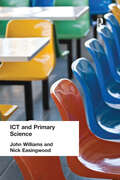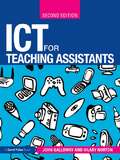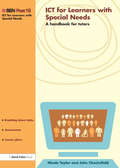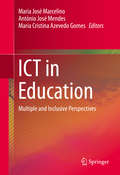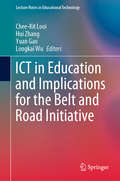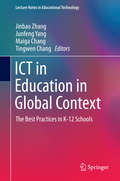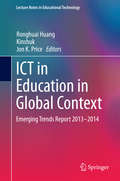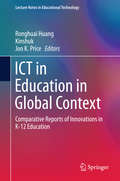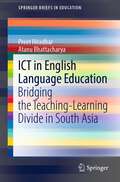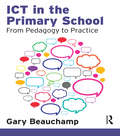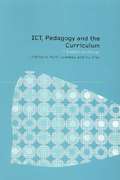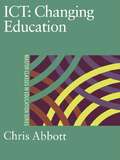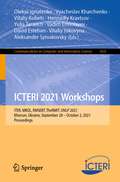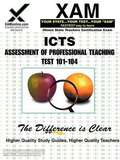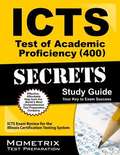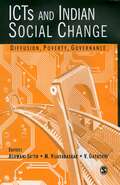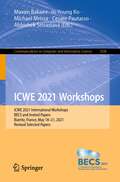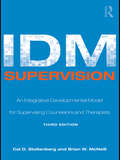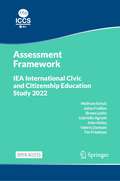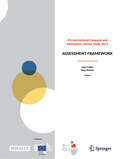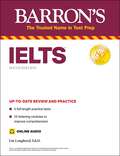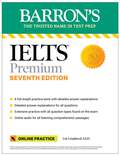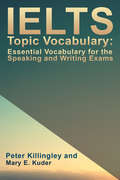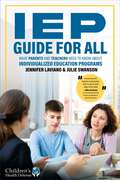- Table View
- List View
ICT and Primary Science
by John Williams Nick EasingwoodThroughout this book, the authors emphasize that primary science is at its best as a practical, hands-on experience for children. When ICT is used in an integral way, it can enable practical work to be done at a more sophisticated level, helping children to make sense of their findings. The book includes several case studies from primary classrooms and each chapter includes practical suggestions for teachers. The wide-ranging topics covered include: databases and spreadsheets data logging control technology ICT, drama and science school visits planning for ICT and science choosing and using software. ICT and Primary Science is an accessible and jargon-free resource for teachers and student teachers of primary science.
ICT for Teaching Assistants
by John Galloway Hilary NortonThe role of ICT in enhancing both teaching and learning in classrooms continues to develop, no more so than when in the hands of effective practitioners. This easy-to-use book outlines the many ways in which it can be used, both as a subject, and as a tool to support learning across the curriculum. Now fully updated to take into account innovations in ICT and the revised National Occupational Standards, ICT for Teaching Assistants looks at the impact of these changes and includes: Practical examples of how ICT, including web-based tools such as ‘blogs’ and ‘wikis’, can be used; Guidance to working competently and safely on the internet; Suggestions for activities with ideas for how these can be used in a variety of contexts; Advice on gathering evidence to help build assessment plans Information on health and safety and legal requirements. With links throughout to the National Occupational Standards for Teaching Assistants at Levels 2 and 3, this accessible book is essential for teaching assistants who wish to develop their confidence in ICT.
ICT for young people with SEN: A handbook for tutors
by Nicole Taylor John ChacksfieldLearning about ICT has all sorts of benefits for young people with SEN but for anyone planning a course, knowing where to start can be difficult. This manual is packed full of practical know-how. It includes: 36 planned sessions ready to deliver; Which hardware software to get and how best to use it and Time-saving photocopiable and downloadable resources.
ICT in Education
by Maria José Marcelino Antonió José Mendes Maria Cristina Azevedo GomesThis book presents a peer reviewed selection of extended versions of ten original papers that were presented at the 15th International Symposium on Computers in Education (SIIE 2013) held in Viseu, Portugal. The book provide a representative view of current Information and Communications Technology (ICT) educational research approaches in the Ibero-American context as well as internationally. It includes studies that range from elementary to higher education, from traditional to distance learning settings. It considers special needs and other inclusive issues, across a range of disciplines, using multiple and diverse perspectives and technologies to furnish detailed information on the latest trends in ICT and education globally. Design, development and evaluation of educational software; ICT use and evaluation methodologies; social web and collaborative systems; and learning communities are some of the topics covered.
ICT in Education and Implications for the Belt and Road Initiative (Lecture Notes in Educational Technology)
by Yuan Gao Chee-Kit Looi Hui Zhang Longkai WuWith increasing global challenges, the Belt and Road initiative seems to offer one possible platform to think about different possibilities and pathways to promote international collaboration and development covering Asia, Europe, Africa, and other countries. Information and Communication Technology (ICT) in education, as a key focus, provides valuable perspectives for governments, inter-governmental and non-governmental agencies wanting to innovate and advance both ICT and education independently and collaboratively. This book highlights the burgeoning of ICT in education in eleven countries, with particular emphasis placed on the context of the Belt and Road Initiative. ICT has increasingly important roles in education including improve teaching and learning qualities, as well as equity in education. The prominent contributors describe the state-of-the-art of ICT in education in eleven countries based on six major themes (policy perspectives, infrastructure, educational resources, ICT integration into practices, students’ ICT competence, and teachers’ professional development). We hope the in-depth discussions included in this book would provoke more academic and policy insights globally.
ICT in Education in Global Context
by Maiga Chang Jinbao Zhang Junfeng Yang Tingwen ChangIntended to promote the innovative use of technology in education and promote educational advances all over the world, this volume brings together 16 best-practice cases on technology-enhanced educational innovations. Experts from Turkey, Tunisia, Cyprus, Italy, Malaysia, China, India and Finland have contributed to these cases, highlighting the current state-of-the-art in the use of technology in education in their respective counties. Topics include best practices for designing smart classrooms, effective use of tablets and interactive whiteboards, virtual learning environments, digital learning spaces, game-based learning, synchronous cyber classrooms, micro-courses, among others. The book offers an essential resource on emerging technologies and the educational approaches currently being pursued in different countries to foster effective learning.
ICT in Education in Global Context
by Kinshuk Ronghuai Huang Jon K. PriceThis book aims to capture the current innovation and emerging trends of digital technologies for learning and education in k-12 sector through a number of invited chapters in key research areas. Emerging Patterns of innovative instruction in different context, Learning design for digital natives, Digital learning resources for personalized learning in both formal and informal educational settings, e-leadership and teacher's digital capacity will be covered in the book. This book intends to provide reference for the innovation in K-12 schools. Researchers, policy makers, school administrators and also teachers could benefit from this book on researchers and methods for innovation in K-12 schools all over the world.
ICT in Education in Global Context
by Kinshuk Ronghuai Huang Jon K. PriceThis book aims to capture the current innovation and emerging trends of digital technologies for learning and education in k-12 sector through a number of invited chapters in key research areas. Emerging Patterns of innovative instruction in different context, Learning design for digital natives, Digital learning resources for personalized learning in both formal and informal educational settings, e-leadership and teacher's digital capacity will be covered in the book. This book intends to provide reference for the innovation in K-12 schools. Researchers, policy makers, school administrators and also teachers could benefit from this book on researchers and methods for innovation in K-12 schools all over the world.
ICT in English Language Education: Bridging the Teaching-Learning Divide in South Asia (SpringerBriefs in Education)
by Preet Hiradhar Atanu BhattacharyaThis book discusses the use of Web 2.0 tools to leverage students’ own use of New Media, which can take learning beyond the classroom. This paradigmatic book will help language educators gain a better understanding of the shift in pedagogic practices through the incorporation of technology in language learning programs. It explores the theoretical underpinnings of ICT in education, before moving on to pragmatic considerations and subsequent implementation of ICT within and beyond language classrooms in the South Asian context. The book covers a wide range of topics, such as the context within which ICT can be placed vis-à-vis teaching and learning in the digital age, as well as the role of ICT in communicative practices, and strategies used to bring these practices to the language classroom. It illustrates how ICT can be incorporated for both receptive as well as productive language learning skills, such as listening, reading, speaking, and writing within pedagogic frameworks. Accordingly, it addresses affordable technologies and how they can be made a part of the teaching–learning experience. Finally, in terms of ICT beyond the classroom, the book provides a broader perspective on ICT in terms of selecting platforms or software, as well as the evaluation of ICT with special reference to ICT policies that offer language educators guidance on managing ICT frameworks within their institutions. Given its scope, the book offers a valuable asset for language educators, teacher trainers, students, and researchers in education and linguistics programs within and outside South Asia.
ICT in the Primary School: From Pedagogy to Practice
by Gary BeauchampThis invaluable new text on ICT offers support, guidance and inspiration to anyone training to teach or currently teaching in primary schools, as well as those studying Education Studies at undergraduate or postgraduate level. The book encourages teachers - and pupils - to realise the potential of the full range of ICT resources. It provides primary teachers with the knowledge, skills and confidence to plan, teach and assess their own ICT lessons, as well as to use ICT creatively across the whole curriculum. This is not a 'how to' guide or collection of lesson plans, but instead balances research-based theory with everyday experiences, challenging you to understand teaching methods and how they translates into a range of suitable teaching strategies for the whole class, small group or individual using ICT.
ICT, Pedagogy and the Curriculum: Subject to Change
by Viv Ellis Avril LovelessThis book explores the impact new information and communication technologies are having on teaching and the way children learn. The book addresses key issues across all phases of primary and secondary education, both in the UK and internationally. ICT, Pedagogy and the Curriculum looks at the relationship between ICT, paradigms of teaching and learning, and the way in which curriculum subjects are represented. Three principal areas are addressed: * the wider perception of ICT in society, culture and schooling* the challenges to pedagogy* the way in which ICT not only supports learning and teaching but changes the nature of curriculum subjects. The tensions between the use of technology to replicate traditional practices, and the possibilities for transforming the curriculum and pedagogy are explored, offering an original and distinctively critical perspective on the way in which we understand ICT in education. It will be of interest to all primary and secondary teachers and those in initial teacher training who are concerned about current technology initiatives in education and how to respond to them.
ICT: Changing Education (Master Classes In Education Ser.)
by Chris AbbottInformation and Communications Technology (ICT) is changing the face of education. In this timely and accessible book, Chris Abbott examines the process by which ICT, and in particular its role in relation to literacy, has become central to national educational policies.The author traces the history of computer use in schools and examines the concept of virtual learning communities using case studies involving learners, parents and educationalists. The role of the Internet is considered along with the differing national policies on its adoption and on developing online context. ICT: Changing Education reveals the development of open and flexible learning as the next stage of ICT's involvement with education.
ICTERI 2021 Workshops: ITER, MROL, RMSEBT, TheRMIT, UNLP 2021, Kherson, Ukraine, September 28–October 2, 2021, Proceedings (Communications in Computer and Information Science #1635)
by Vitaliy Yakovyna Aleksander Spivakovsky Vadim Ermolayev Vyacheslav Kharchenko Oleksii Ignatenko Vitaliy Kobets Hennadiy Kravtsov Yulia Tarasich David EstebanThis book contains the workshops papers presented at the 17th International Conference on Information and Communication Technologies in Education, Research, and Industrial Applications, ICTERI 2021, held in Kherson, Ukraine, in September-October 2021. The 33 revised full papers and 4 short papers included in this volume were carefully reviewed and selected from 105 initial submissions. The papers are organized according to the following workshops: 9th International Workshop on Information Technology in Economic Research (ITER 2021); 5th International Workshop on Methods, Resources and Technologies for Open Learning and Research (MROL 2021); International Workshop RMSEBT 2021: Rigorous Methods in Software Engineering and Blockchain Technologies; 7th International Workshop on Theory of Reliability and Markov Modeling for Information Technologies (TheRMIT 2021); 1st Ukrainian Natural Language Processing Workshop (UNLP 2021).
ICTS APT Assessment of Professional Teaching 101-104: Teacher Certification (2nd edition)
by Sharon WynneWith 23 competencies/skills found on the ICTS Assessment of Professional Teaching test and 122 sample-test questions, this guide, aligned specifically to standards prescribed by the Illinois Department of Education, covers the sub-areas of foundations, characteristics, and assessment; planning and delivering instruction; managing the learning environment, and more.
ICTS Test of Academic Proficiency (400) Secrets Study Guide: ICTS Exam Review for the Illinois Certification Testing
by Icts Exam Secrets Test Prep StaffIf you want to ace the ICTS Test of Academic Proficiency (400), without spending weeks or even months of long nights on boring, tedious study, then ICTS Test of Academic Proficiency (400) Secrets is the resource you need. Our comprehensive ICTS Test of Academic Proficiency (400) Secrets study guide was developed and compiled by educational testing experts, who painstakingly researched every topic and concept that you need to know to do well on the exam. Our original research reveals specific weaknesses of the ICTS Test of Academic Proficiency (400), which you can take advantage of to earn an exam score higher than you thought possible, and start on the education career of your dreams. ICTS Test of Academic Proficiency (400) Secrets covers: Mathematics: Arithmetic and Basic Algebra, Geometry, Functions and their Graphs, Probability and Statistics, Analytical Geometry, Discrete Mathematics, Linear Algebra, Computer Science, Mathematical Reasoning and Modeling, Standard Units of Measurement, Visual Displays of Quantitative Information Reading Comprehension: Figurative Language and other Literary Elements, Literary Forms and Genres, Interpreting Texts in Historical and Cultural Contexts, American Literature, British Literature, World Literature Language Arts: Principles of Language Development, History and Development of the English Language, History and Development of American English, Elements of Grammar, Elements of Semantics, Elements of Rhetoric and much more. . .
ICTs and Indian Social Change: Diffusion, Poverty, Governance
by Ashwani Saith M. Vijayabaskar V. GayathriICTs and Indian Social Change: Diffusion, Poverty, Governance is the first book of its kind that puts together the optimistic voices of techno-idealists, critical social science perspectives on technology and a range of empirical material on the impact of Information and Communication Technologies (ICTs) on the lives of people. The book traces these processes across urban and rural spaces of work, consumption, e-governance, and highlights the new kinds of social identities they are fostering in India. It opens up an arena for dialogue between activists, technologists, policy makers and academia on using ICTs for development. The book is a logical sequel to ICTs and Indian Economic Change: Economy, Work, Regulation that addressed the implications of the growth of ICT-based sectors in India for macro-economic development and industrial efficiency. This volume views the diffusion of ICTs in India primarily in the socio cultural realm. In responding to the pioneering voices of innovators in ICTs, it provides empirical and theoretical assessments and critiques of some of the important though often latent, premises that underlie these powerful initiatives.
ICWE 2021 Workshops: ICWE 2021 International Workshops, BECS and Invited Papers, Biarritz, France, May 18–21, 2021, Revised Selected Papers (Communications in Computer and Information Science #1508)
by Cesare Pautasso Michael Mrissa Maxim Bakaev In-Young Ko Abhishek SrivastavaThis book constitutes the thoroughly refereed post-workshop proceedings of the 21th International Conference on Web Engineering, ICWE 2021, held in Biarritz, France, in May 2021.*The first international workshop on Big data-driven Edge Cloud Services (BECS 2021) was held to provide a venue in which scholars and practitioners can share their experiences and present on-going work on providing value-added Web services for users by utilizing big data in edge cloud environments. The 5 revised full papers and 1 revised short contribution selected from 11 submissions are presented with 2 invited papers.*The conference was held virtually due to the COVID-19 pandemic.
IDM Supervision: An Integrative Developmental Model for Supervising Counselors and Therapists, Third Edition (Counseling and Psychotherapy)
by Cal D. Stoltenberg Brian W. McNeillThe third edition of this book is an updated and expanded presentation of the widely used Integrative Developmental Model of Supervision. In contrast to other volumes on clinical supervision, Stoltenberg and McNeill present a comprehensive, time-tested, and empirically investigated model of supervision, rather than a broad summary of other existing or historical approaches. In addition to presenting a model of therapist development that spans beginning through advanced training, the book integrates theory and research from numerous perspectives, including learning, cognition, and emotion, as well as an up-to-date treatment of research directly addressing the supervision process. The model also examines the role of clinical supervision from an evidence-based practice perspective and addresses issues of common factors in therapy. The impact of cultural issues in supervision and training, as well as recent work in a competencies approach to supervision and trainee development, are also examined.
IEA International Civic and Citizenship Education Study 2022 Assessment Framework
by Julian Fraillon John Ainley Wolfram Schulz Tim Friedman Bruno Losito Gabriella Agrusti Valeria DamianiThis open access publication outlines the underlying framework for gathering data on civic knowledge, attitudes, and engagement as well as contextual information, and it describes the assessment design for the International Association for the Evaluation of Educational Achievement’s (IEA) International Civic and Citizenship Education Study 2022.The IEA International Civic and Citizenship Study (ICCS) investigates how young people are prepared to undertake their roles as citizens in a range of countries in the second decade of the 21st century. ICCS 2022 is a continuation of two earlier IEA studies, ICCS 2009 and ICCS 2016, and, for the first time, this survey includes the option of a computer-based assessment. Responding to enduring and emerging challenges of educating young people in a world where contexts of democracy and civic participation continue to change, the study addresses issues related to young people’s engagement through digital technologies, migration and diversity, perceptions of the political system, global citizenship, and education for sustainable development. Over the past 50 years, IEA has conducted comparative research studies in a range of domains focusing on educational policies, practices, and outcomes in many countries around the world. Prior to ICCS 2022, IEA conducted four international comparative studies of civic and citizenship education, with a first survey implemented in 1971, a second one in 1999, third in 2009 and fourth in 2016. ICCS 2022 data will allow education systems to evaluate the strengths of educational policies, both internationally, and in a regional context, and to measure progress in achieving critical components of their educational policy agendas.
IEA International Computer and Information Literacy Study 2023: Assessment Framework
by Julian Fraillon Mojca RožmanThis open access book presents the conceptual and operational foundations of the IEA International Computer and Information Literacy Study (2023), which is designed to assess how well students are prepared for study, work, and life in a digital world. The study measures international differences in students’ computer and information literacy (CIL): their ability to use computers to investigate, create, participate and communicate at home, at school, in the workplace and in the community. Participating countries also have an option for their students to complete an assessment of computational thinking (CT). The ICILS assessment framework articulates the basic structure of the study. It provides a description of the field and the constructs to be measured. It outlines the design and content of the measurement instruments, sets down the rationale for those designs, and describes how measures generated by those instruments relate to the constructs. In addition, it hypothesizes relations between constructs so as to provide the foundation for some of the analyses that follow.
IELTS (Barron's Test Prep)
by Lin Lougheed Ph.D.Publisher's Note: Products purchased from Third Party sellers are not guaranteed by the publisher for quality, authenticity, or access to any online entitlements included with the product. Barron&’s updated IELTS provides practice for both Academic and General Training tests. Get practice and explanations for all of the question types, plus audio tracks for the listening section.This edition features:Four practice Academic tests reflective of the most recent examsTwo practice General Training testsOnline audio for all tests and activitiesAn audioscript for the listening sectionsExplanatory answers for all test questionsPractice with all question types, including multiple-choice, short answer, sentence completion, flowchart completion, graphs, tables, note taking, summarizing, labeling diagrams and maps, classification, matching, and selecting from a listThe IELTS is used as a measure of English-language proficiency by over 7,000 educational institutions, government departments and agencies, and professional organizations in 135 countries.
IELTS Premium: 6 Practice Tests + Comprehensive Review + Online Audio, Seventh Edition (Barron's Test Prep)
by Lin Lougheed Ph.D.Barron&’s updated IELTS Premium provides practice for both Academic and General Training tests. Get practice and explanations for all of the question types, plus audio tracks for the listening section.This edition features:Four practice Academic tests reflective of the most recent examsTwo practice General Training testsOnline audio for all tests and activitiesAn audioscript for the listening sectionsExplanatory answers for all test questionsPractice with all question types, including multiple-choice, short answer, sentence completion, flowchart completion, graphs, tables, note taking, summarizing, labeling diagrams and maps, classification, matching, and selecting from a list
IELTS Topic Vocabulary: Essential Vocabulary For The Speaking And Writing Exams
by Peter KillingleyThis book is invaluable for all the students preparing for the IELTS exam. It contains essential topic-specific vocabulary for the exam, divided into 20 topics, as well as two separate sections on useful vocabulary for the writing exam, including collocations. There is also a section on idiomatic language that can be used in speaking exam. Exercises throughout the book reinforce the vocabulary so that it becomes active, enabling you to use it in the exam and boost your IELTS band score.
IEP Guide for All: What Parents and Teachers Need to Know About Individualized Education Programs
by Jennifer Laviano Julie SwansonA Comprehensive and Accessible Guide to the IEP Process The IEP process can be confusing, frustrating, and time-consuming. Understanding what your child or student needs is one thing, but getting them help and resources can be another thing altogether. Drawing on decades of experience, Jennifer Laviano and Julie Swanson are uniquely positioned to guide both parents and teachers through the IEP process. The IEP Guidefor All breaks down the legal and standardized language and will leave parents feeling confident while navigating the IEP process. Whether you're a parent, a first-time educator, or an experienced educator, this guide will help get students the resources they need and highlight what everyone needs to know about the IEP process."A must-have for teachers and parents, and I've sat on both sides of the table."—Allie Grafman, CT Parent Advocate and former coordinator of Special Education
IEP and Section 504 Team Meetings...and the Law
by Miriam Kurtzig FreedmanYour quick flipbook guide to IEP and 504 meetings How can educators and administrators best conduct IEP and Section 504 team meetings, ensure parent participation, and build trust while maintaining a legal, efficient, and effective process? This easy-to-read flipbook answers this question and more by providing practical guidance for educational best practices, all while making the language of law easy to read and understand. A handy reference guide, this book is designed to be used again and again to practice and refine team meetings—and hopefully take some of the pain out of the process. The flipbook includes: · An overview of the purposes and procedures of IEP and 504 meetings · A clear delineation of what constitutes a team’s job—and what to avoid · Best practices, including language to use and tips to keep meetings on track · Helpful do’s and don’ts to facilitate productive and legal meetings that ensure students receive the services they need Numerous bulleted lists, real world examples, and a detailed appendix, including links to case law, make this handbook an invaluable everyday companion for everyone who participates in IEP and 504 meetings.
